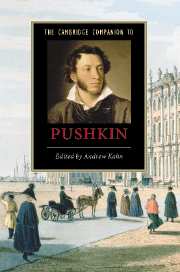Introduction
Published online by Cambridge University Press: 28 March 2007
Summary
Alexander Pushkin changed the course of Russian literature. Ceaselessly experimental, he is the author of the greatest body of lyric poetry in the language; a remarkable novelist in verse, and a pioneer of Russian prose fiction; an innovator in psychological and historical drama; and an amateur historian of serious purpose. Pushkin’s protean talent was legendary in his own lifetime. Both contemporary and later readers invoke the names of Shakespeare and Mozart to convey the impact of his artistic genius and the seeming effortlessness of his creative imagination. Russian writers of every generation, from Fedor Dostoevsky to Vladimir Nabokov and Joseph Brodsky, turn back to Pushkin, making him an interlocutor and acknowledging his presence as a continuous creative force. At the same time, he remains for Russians the indispensable writer, a genuinely popular classic, a cultural icon, a biographical obsession.
Underlying the protean diversity are unifying patterns of thought and theme. The interconnections between different types in Pushkin’s creation bear witness to his impulse to refract historical, philosophical, psychological and autobiographical interests through multiple literary forms. This multiplicity of literary expression captures the essential mobility of Pushkin’s thinking which preferred play and openness to definitive answers, and irony and ambiguity to didacticism, in the certain knowledge that these were the hallmarks of a free mind and in their own right anti-authoritarian.
- Type
- Chapter
- Information
- The Cambridge Companion to Pushkin , pp. 1 - 8Publisher: Cambridge University PressPrint publication year: 2006

